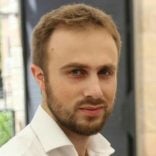The tragic death of an 8-year-old Palestinian brought Jerusalem’s Jews and Arabs together
Published January 27, 2020
JERUSALEM (JTA) — On Friday, in the Jerusalem neighborhood of Beit Hanina, 8-year-old Qais Abd Abu Ramileh drowned in a pit filled by last week’s torrential rains. Reading the news after Shabbat, I was saddened to hear about Qais’ death.
From when he was reported missing until early Saturday morning, Israeli police officers, firefighters, municipal workers, local Jews and Palestinians worked together to find the boy or recover his body. After local Palestinians broke through the fence of another pit Qais was rumored to have fallen into, “the [Israeli] police shot flares to assist the searchers as the Palestinians shouted encouragement to them.”
While there were early rumors that the boy may have been kidnapped by settlers, as Haaretz reported, “this unusual cooperative effort significantly eased the tension in the city.”
ADVERTISEMENT
This, however, was not how the story was told initially to international readers.
Israel detractors around the world, from Palestinian Authority official Hanan Ashrawi to British politician George Galloway to U.S. Rep. Rashida Tlaib, were already pushing the unfounded claim that Qais was kidnapped and executed by Jewish settlers.
I was disgusted by the shameless exploitation of this tragedy. But I was incensed as well that ignorant observers are only capable of seeing life in Jerusalem through the lens of conflict.
Far from being a story of Jew vs. Arab, this was a story of hundreds of Jews and Arabs working through the night to search for a lost son of this city. Despite the fact that it was Shabbat, Jewish first responders from as far away as the religious communities of the West Bank’s Gush Etzion area came to aid the search.
ADVERTISEMENT
The socioeconomic reality in Jerusalem is far from being perfect. Underinvestment in public infrastructure in eastern Jerusalem might explain why Qais drowned in a pit in the middle of the city. But framing this case as a result of “The Conflict” is inexact, misleading and harmful.
Over the past two years, Israel has opened five community police centers in Arab neighborhoods, including one in Beit Hanina, to have better law enforcement through trust building and by working with community leaders. In this case, as in other neighborhoods, we’ve started to see the fruits of these efforts and a change in the relations between the Arab communities and Israeli security forces.
Qais was a student at the Il-Irtikaa (”improve”/”upgrade”) public school. Public education in eastern Jerusalem has historically been lacking, driving families to seek out private schools or institutions in which kids are taught the Palestinian Authority curriculum. Beyond incitement against Israel in its textbooks and end of high-school examination, the P.A. curriculum doesn’t offer modern vocational training and correlates with higher dropout rates. It also makes it a long and expensive journey for students to later attend higher education in Jerusalem.
But in the last year and a half, Israel has been implementing a 2 billion shekel (about $578 million) investment program for these Arab neighborhoods, with around half the sum dedicated to public education. In a public school (and all the more in a school such as Il-Irtikaa, which emphasizes language learning), students like Qais were taught Hebrew — the language of his Jewish neighbors — from third grade.
I am personally familiar with this community; my organization runs a Hebrew class for Il-Irtikaa’s parent community. I believe the courses we provide give the necessary tools for integration into the Israeli-led Jerusalem economy, fostering shared interests between both populations. But beyond that, Hebrew learning is a unique prism through which to meet the culture of the city’s majority group.
The death of any 8-year-old is an absolute tragedy, any parent’s worst nightmare. Instead of using it to further inflame the region and pit Jews against Arabs, the story should be used to highlight the need for more Jewish-Arab cooperation and desperately needed infrastructural improvements and further investment in our neighborhoods. Only when we acknowledge that our strength comes from working together will Jerusalem’s residents build a truly united city.

is projects manager at the Institute for Zionist Strategies. He lives in Jerusalem.














